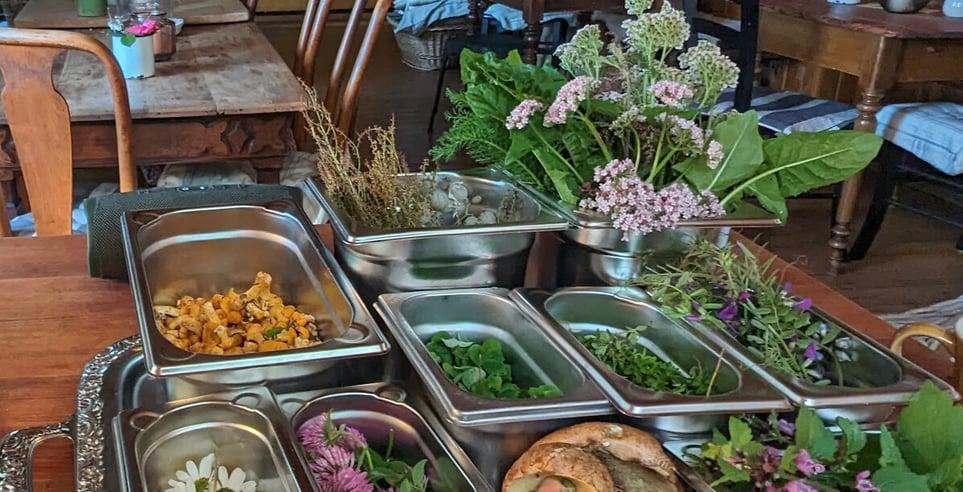Exploring Regenerative Culture in the Kitchen
An exploratory essay on the topic of developing a regenerative working culture in commercial kitchens.
Melvin Jarman
9/28/20244 min read


The Essence of Regenerative organisations
Regenerative culture is a concept that focuses on revitalizing and enhancing the ecosystems we inhabit, in this case in our kitchens. By adopting practices that not only sustain but also enrich our environment, we can foster a deeper connection to the food we consume and the resources we rely on. This approach encourages individuals to think critically about their food choices and the impact of those choices on both their health and the planet.
Implementing regenerative operational practices within our kitchens is on the one hand relatively straightforward. This is done by, for example by sourcing ingredients from sustainable and local producers, choosing to buy from farmers' markets or engaging in community-supported agriculture (CSA). Additionally, we can embrace seasonal eating, which not only lends itself to more flavourful meals, but can support local agriculture and enhance local economies and minimize the carbon footprint associated with long-distance food transportation. On the other hand, this calls for a highly committed workforce and the development of a culture that can be regenerative on a human and social level, so that the organisation can at core survive and in good times thrive, and bring its values, assumptions and beliefs to the world in a way that creates positive, regenerative impact.
What about regenerative culture
An aspect so often overlooked that is truly integral to the question of developing and sustaining an organised group of people (organisation), is its culture. But what is organisational culture? The simplest definitions include 'the way we do things around here' and 'the shared assumptions, values and beliefs about the ways people should interact'. Its importance was glibly summarised by suggesting that 'Culture eats strategy for breakfast' - a statement that stands true to my experience at least. Others describe culture through the metaphor of the iceberg as the part of the organisation that is below the water.
Unpacking the statement that culture eats strategy for breakfast, the essence becomes apparent as organisational integrity - what Chris Argyris identified as the gap between espoused ideals (which inspire the people involved, at least initially) and the theory-in-use - which can only be inferred from behaviour (as opposed to the values held and espoused to ourselves as well as others). Regardless of the values espoused, if the practice is contradictory to the enactment of the espoused values that are supposed to inspire their people, the organisation will struggle. This is perhaps more straightforward in a conventional organisation - raise the bar by holding up high ideals, and the topic becomes even more important.
Kitchens are well placed to explore this topic, as they are renowned for having a past-paced, pressured and often consequently toxic culture, yet more and more chefs are proving that this is not necessary to achieve excellence - and in fact it very much holds back the organisations chances of sustainability, let alone - in the case of organisations that wish to uphold, and therefore espouse ethical values - an ability to be regenerative.
Implementing Regenerative Practices in the Kitchen
To cultivate a regenerative culture, all of the theorists are clear that a fundamental aspect is the kind of thinking people are utilising. This is a complex topic that is perhaps best explored by placing a few observational examples on the table, in this case the topic of hierarchy and leadership.
Kitchens need hierarchy to operate effectively. But what kind of hierarchy? If we are looking for right and wrong answers and/or are operating from a command-and-control paradigm (remember this can best be inferred from behaviour), then the natural solution is to create a hierarchy of roles and the people who enact them, in order to maintain order. This creates endless power games and bottlenecks where key feedback is not able to be integrated by the organisation. If the thinking is more exploratory and integrative, one see that a dynamic hierarchy of roles that is de-coupled from becoming a hierarchy of people (leadership is seen as a process occurring between people, rather than a uni-directional relationship between leader and follower), is both much more pleasurable for the people involved, and consequently, those people have more energy for their work - so the organisation is more effective - and it's its objectives are to be regenerative, then it will be more effective in this.
The other side of the coin, is the individual attitudes that the members of the organisation carry. A regenerative culture is not suited to everyone, especially those who wish to be led - then a more traditional hierarchy is pretty much being called for. One has to find, and encourage intrinsic motivation in people (and/or intrinsically motivated people). Whilst this is ultimately down to the individual whether they find this kind of motivation, one thing Bernard Lievegoed suggests organisations can do, is to try to identify what is unique in people, and provide ways for their expression of their uniqueness through their work. I experienced this in a past job at the beloved Hathersage Social Club, and it was a transformational experience I will never forget.
I will end on this more individual topic. I often say that a 'secret' that seems hidden to so many, is that working hard is actually the easiest way to navigate the world of work. The secret also being that you don't work hard for your boss, manager or even organisation, but for yourself, your self-worth and the integrity of the values you hold. If you can find alignment between your values, and an organisation that strives to manifest them (or if an organisation can facilitate this dynamic), then you become unstoppable - and the organisation has an opportunity to maximise its positive impact and influence on the world.
